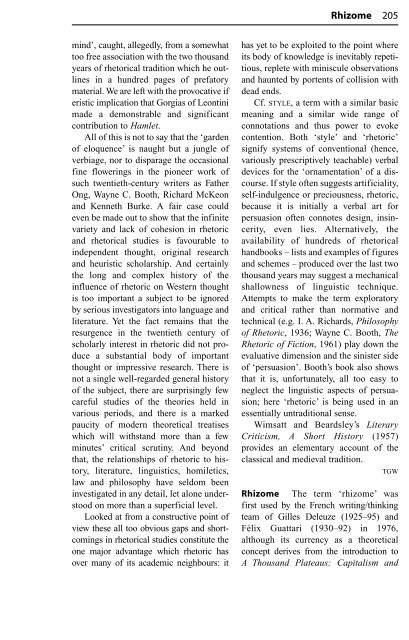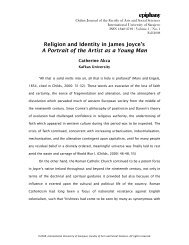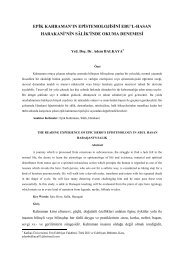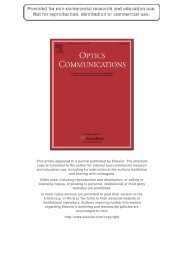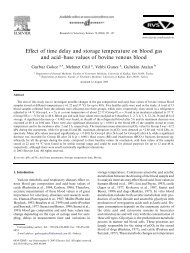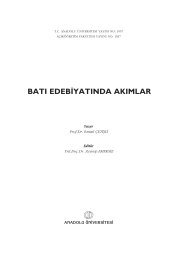The Routledge Dictionary of Literary Terms
The Routledge Dictionary of Literary Terms
The Routledge Dictionary of Literary Terms
Create successful ePaper yourself
Turn your PDF publications into a flip-book with our unique Google optimized e-Paper software.
mind’, caught, allegedly, from a somewhat<br />
too free association with the two thousand<br />
years <strong>of</strong> rhetorical tradition which he outlines<br />
in a hundred pages <strong>of</strong> prefatory<br />
material. We are left with the provocative if<br />
eristic implication that Gorgias <strong>of</strong> Leontini<br />
made a demonstrable and significant<br />
contribution to Hamlet.<br />
All <strong>of</strong> this is not to say that the ‘garden<br />
<strong>of</strong> eloquence’ is naught but a jungle <strong>of</strong><br />
verbiage, nor to disparage the occasional<br />
fine flowerings in the pioneer work <strong>of</strong><br />
such twentieth-century writers as Father<br />
Ong, Wayne C. Booth, Richard McKeon<br />
and Kenneth Burke. A fair case could<br />
even be made out to show that the infinite<br />
variety and lack <strong>of</strong> cohesion in rhetoric<br />
and rhetorical studies is favourable to<br />
independent thought, original research<br />
and heuristic scholarship. And certainly<br />
the long and complex history <strong>of</strong> the<br />
influence <strong>of</strong> rhetoric on Western thought<br />
is too important a subject to be ignored<br />
by serious investigators into language and<br />
literature. Yet the fact remains that the<br />
resurgence in the twentieth century <strong>of</strong><br />
scholarly interest in rhetoric did not produce<br />
a substantial body <strong>of</strong> important<br />
thought or impressive research. <strong>The</strong>re is<br />
not a single well-regarded general history<br />
<strong>of</strong> the subject, there are surprisingly few<br />
careful studies <strong>of</strong> the theories held in<br />
various periods, and there is a marked<br />
paucity <strong>of</strong> modern theoretical treatises<br />
which will withstand more than a few<br />
minutes’ critical scrutiny. And beyond<br />
that, the relationships <strong>of</strong> rhetoric to history,<br />
literature, linguistics, homiletics,<br />
law and philosophy have seldom been<br />
investigated in any detail, let alone understood<br />
on more than a superficial level.<br />
Looked at from a constructive point <strong>of</strong><br />
view these all too obvious gaps and shortcomings<br />
in rhetorical studies constitute the<br />
one major advantage which rhetoric has<br />
over many <strong>of</strong> its academic neighbours: it<br />
Rhizome 205<br />
has yet to be exploited to the point where<br />
its body <strong>of</strong> knowledge is inevitably repetitious,<br />
replete with miniscule observations<br />
and haunted by portents <strong>of</strong> collision with<br />
dead ends.<br />
Cf. STYLE, a term with a similar basic<br />
meaning and a similar wide range <strong>of</strong><br />
connotations and thus power to evoke<br />
contention. Both ‘style’ and ‘rhetoric’<br />
signify systems <strong>of</strong> conventional (hence,<br />
variously prescriptively teachable) verbal<br />
devices for the ‘ornamentation’ <strong>of</strong> a discourse.<br />
If style <strong>of</strong>ten suggests artificiality,<br />
self-indulgence or preciousness, rhetoric,<br />
because it is initially a verbal art for<br />
persuasion <strong>of</strong>ten connotes design, insincerity,<br />
even lies. Alternatively, the<br />
availability <strong>of</strong> hundreds <strong>of</strong> rhetorical<br />
handbooks – lists and examples <strong>of</strong> figures<br />
and schemes – produced over the last two<br />
thousand years may suggest a mechanical<br />
shallowness <strong>of</strong> linguistic technique.<br />
Attempts to make the term exploratory<br />
and critical rather than normative and<br />
technical (e.g. I. A. Richards, Philosophy<br />
<strong>of</strong> Rhetoric, 1936; Wayne C. Booth, <strong>The</strong><br />
Rhetoric <strong>of</strong> Fiction, 1961) play down the<br />
evaluative dimension and the sinister side<br />
<strong>of</strong> ‘persuasion’. Booth’s book also shows<br />
that it is, unfortunately, all too easy to<br />
neglect the linguistic aspects <strong>of</strong> persuasion;<br />
here ‘rhetoric’ is being used in an<br />
essentially untraditional sense.<br />
Wimsatt and Beardsley’s <strong>Literary</strong><br />
Criticism, A Short History (1957)<br />
provides an elementary account <strong>of</strong> the<br />
classical and medieval tradition.<br />
TGW<br />
Rhizome <strong>The</strong> term ‘rhizome’ was<br />
first used by the French writing/thinking<br />
team <strong>of</strong> Gilles Deleuze (1925–95) and<br />
Félix Guattari (1930–92) in 1976,<br />
although its currency as a theoretical<br />
concept derives from the introduction to<br />
A Thousand Plateaus: Capitalism and


